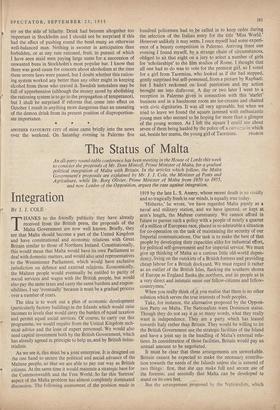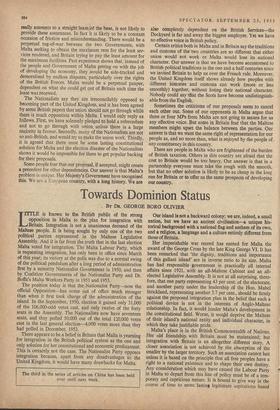The Status of Malta An all-party round-table conference has been
meeting in the House of Lords this week to consider the proposals of Mr. Dom Mintoff, Prime Minister of Malta, for a gradual political integration of Malta with Britain. In the articles which follow, the Malta Government's proposals are explained by Mr. J. J. Cole, the Minister of Posts and Agriculture, while Dr. Borg Olivier, Prime Minister ,of Malta from 1950 to 1955, and now Leader of the Opposition, argues the case against integration.
Integration
BY J. J. COLE THANKS to the friendly publicity they have already received from the British press, the proposals of the Malta Government are now well known. Briefly, they are that Malta should, become a part of the United Kingdom and have constitutional and economic relations with Great Britain similar to those of Northern Ireland. Constitutionally, this would mean that Malta would have its own Parliament to deal with domestic matters, and would also send representatives to the Westminster Parliament, which would have exclusive jurisdiction on defence and external relations. Economically, the Maltese people would eventually be entitled to parity of social services and wages with the British people, but would also pay the same taxes and carry the same burdens and respon- si6ilities. I say 'eventually' because it must be a gradual process over a number of years.
The idea is to work out a plan of economic development (particularly factory building) in the Islands which would raise incomes to levels that would carry the burden of equal taxation and permit equal social services. Of course, to carry out this programme, we would require from the United Kingdom tech- nical advice and the loan of expert personnel. We would also need capital investment both by the British Government, which has already agreed in principle to help us, and by British indus- trialists.
As we see it, this must be a joint enterprise. It is designed on the one hand to secure the political and social advance of the Maltese people, so that we are able to pay our way as British o citizens. At the same time it would maintain a strategic base for the Commonwealth and the Free World. So far this 'fortress' aspect of the Malta problem has almost completely dominated discussion. The following assessment of the position made in 1919 by the late L. S. Amery, whose recent death is so vividly and so tragically fresh in our minds, is equally true today.
`Hitherto,' he wrote, 'we have regarded Malta purely as a naval and military station, and we have ignored, or kept at arm's length, the Maltese community. We cannot afford in future to pursue such a policy with a people of nearly a quarter of a million of European race, placed in so admirable a situation for co-operation on the task of maintaining the security of our Imperial communications. Our task is to make the best of that people by developing their capacities alike for industrial effort, for political self-government and for imperial service. We must give up thinking of Malta as a curious little old-world depen- dency, living on the outskirts of a British fortress and providing cheap labour for a British dockyard. We must regard it rather as an outlier of the British Isles, flanking the southern shores of Europe as England flanks the northern, and its people as in a very direct and intimate sense our fellow-citizens and fellow- countrymen.'
When you really think of it you realise that there is no other solution which serves the true interests of both peoples.
Take, for instance, the alternative proposed by the Opposi- tion Party on Malta. The Nationalists want Dominion status. Though they do not say it in so many words, what they really want is independence. They are a party which has leaned towards Italy rather than Britain. They would be willing to let the British Government use the strategic facilities of the Island and have a joint say in the handling of Malta's external rela- tions. In consideration of those facilities, Britain would pay an annual amount to be negotiated.
It must be clear that these arrangements are unworkable. Britain cannot be expected to „make the necessary contribu- tion towards the needs of the Islands unless she is assured of two things : first, that she can make full and secure use of the fortress; and secondly that Malta can be developed to Stand on its own feet.
But the arrangement proposed by the Nationalists, which really amounts to a straight lease of the base, is not likely to provide these assurances. In fact it is likely to be a constant occasion of friction and misunderstanding. There would be a perpetual tug-of-war between the two Governments, with Malta seeking to obtain the maximum rent for the least ser- vices rendered, and Britain trying to pay the least amount for the maximum facilities. Past experience shows that, instead of the people and Government of Malta getting on with the job of developing the economy, they _would be side-tracked and demoralised by endless disputes, particularly over the rights of the British Forces. Malta would be a perpetual pauper, dependent on what she could get out of Britain each time the lease was renewed.
The Nationalists say they are irreconcilably opposed to becoming part of the United Kingdom, and it has been agreed by some British papers that union should not go through while there is much opposition within Malta. I would only reply as follows. First, we have solemnly pledged to hold a referendum and not to go through with union, unless there is a large majority in favour. Secondly, many of the Nationalists are not so anti-British, and would try to make the union work. Thirdly, it is agreed that there must be some lasting constitutional solution for Malta and the election disaster of the Nationalists shows it would be impossible for them to get popular backing for their proposals.
Some people fear that our proposal, if accepted, might create a precedent for other dependencies. Our answer is that Malta's problem is unique. Her Majesty's Government have recognised this. We are a European country, with a long history. We are also completely dependent on the British Services—the Dockyard is far and away the biggest employer. Yet we have no effective voice in British policy.
Certain critics both in Malta and in Britain say the traditions and customs of the two countries are so different that either union would not work or Malta would lose its national character. Our answer is that we have become accustomed, to British political traditions in the one and a half centuries since we invited Britain to help us over the French rule. Moreover, the United Kingdom itself shows already how peoples with different histories and customs can work (more or less smoothly) together, without losing their national character. Nobody could say that the Scots have become undistinguish- able from the English.
Sometimes the criticisms of our proposals seem to cancel each other out. Some of our opponents in Malta argue that three or four MPs from Malta are not going to secure for us any effective voice. But some in Britain fear that the Maltese members might upset the balance between the parties. Our answer is that we want the same right of representation for our people as, and no more than, what is enjoyed by the people of any constituency in this country.
There are people in Malta who are frightened of the burden of British taxation. Others in this country are afraid that the cost to Britain would be too heavy. Our answer is that in a partnership everyone must take the rough with the smooth, but that no other solution is likely to be as cheap in the long run for Britain or to offer us the same prospects of developing OUT country.

































 Previous page
Previous page